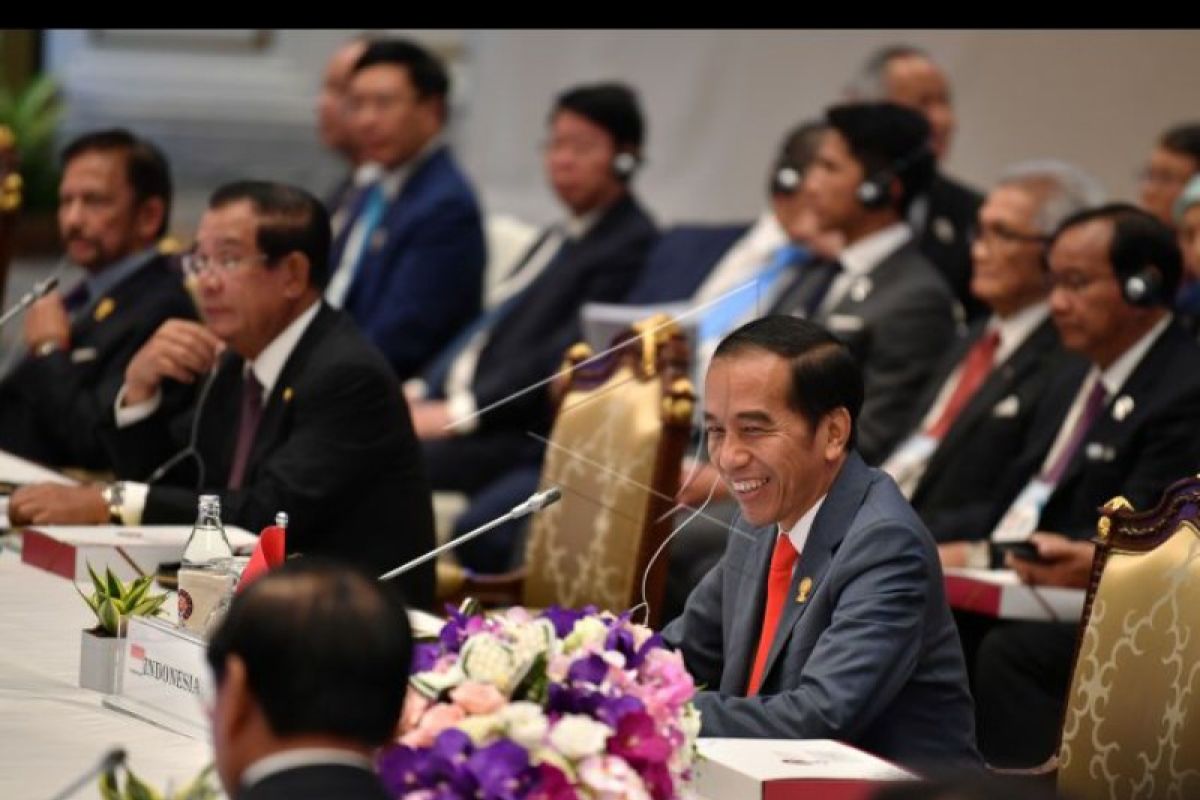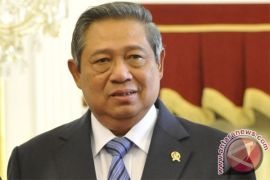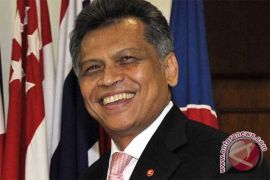The agreement on the ASEAN Outlook on the Indo-Pacific is the right step toward that directionJakarta (ANTARA) - The ASEAN Outlook on the Indo-Pacific was successfully endorsed and adopted by the leaders of the Southeast Asian countries at the 34th ASEAN Summit in June.
The agreement has become a special gift for the Association of the Southeast Asian Nations, which turned 52 on August 8, 2019. The Indo-Pacific outlook of Indonesia's proposal became ASEAN's guideline to face the power play among great powers in the Southeast Asian region.
The similarity of views cannot be separated from the role of Indonesia, which has been persistent in lobbying its Indo-Pacific outlook to the nine leaders of other ASEAN member countries.
The ASEAN's first outlook is expected to be able to maintain regional stability and ensure the Association of Southeast Asian Nations can determine its future and not be subject to the whims of certain major powers.
This outlook reaffirms ASEAN's position not to side with any major powers which are struggling to compete for influence in the ASEAN region.
The struggle for influence is motivated because the Southeast Asian region has very strategic value as it becomes a path of world trade traffic between countries in East Asia from countries in Europe, Africa, the Middle East, and India.
Related news: ASEAN leaders agree to adopt ASEAN Outlook on Indo-Pacific
With a population of around 660 million people and well-preserved regional stability, ASEAN has made the superpowers fall in love with the region located between the Indian and the Pacific Oceans.
Through the ASEAN Outlook on the Indo-Pacific, ASEAN currently has its guidelines in protecting the common interests in the Indo-Pacific amid the growing rivalry between the United States and China.
The adoption of the ASEAN Outlook on the Indo-Pacific becomes an important point in maintaining ASEAN's central role in maintaining peace, stability and prosperity in the Southeast Asian region.
The Indo-Pacific concept also becomes a tool for ASEAN to participate in solving problems in the region, therefore the dialogue partner countries, namely Australia, China, India, Japan, New Zealand, South Korea, and the United States, can respond to the ASEAN perspective.
The willingness of partner countries to harmonize their version of Indo-Pacific ideas with the Indo-Pacific conception developed by ASEAN proved the credibility of the regional cooperation, said Dr. Teuku Rezasyah, a lecturer in international relations in the Humanities and Political Science Faculty of Padjadjaran University.
As a consequence, ASEAN needs to undertake various alignment scenarios, based on regional sovereignty, the right to live in good neighborhoods, and equality in international law, without the need to create new rivalries among Indo-Pacific countries, which are very diverse and have regional scenarios that are different.
Building an understanding of the five themes raised by Minister Retno Marsudi still requires the hard work of the Indonesian government and various professional circles in the Indonesian Republic that have international competence and networks, continued Teuku Rezasyah. In this case, the universities, research institutions, the business world, and the mass media.
To create an understanding of flexible organizational infrastructure, strategic conceptions should not lead to the formation of new coalitions, fair and sustainable relations, and achievement mechanisms that are not rushed.
Those are very important to prevent the sporadic ideas of the Indo-Pacific members which can damage the nuances of the stability of the developed area, Teuku Rezasyah noted.
Based on the document of ASEAN Outlook on the Indo-Pacific, ASEAN will undertake cooperation in a broad range of areas, including maritime cooperation, connectivity, UN Sustainable Development Goals 2030, and Economic and Other Possible Areas of Cooperation.
Related news: Adoption of Indo-Pacific outlook document reflects ASEAN centrality
Emphasizing function
Indonesian Ambassador to the United Kingdom, Ireland and the International Maritime Organization (IMO) Rizal Sukma stated that the ASEAN Outlook on the Indo-Pacific was a strategic necessity. ASEAN can no longer just sit and watch extra-regional powers actively shape the future of its region.
ASEAN must ensure that its two core interests — ASEAN centrality and strategic autonomy of the region — will be preserved, enhanced and reinforced. ASEAN hopes that the ASEAN Outlook on the Indo-Pacific will provide the necessary platform to do that, Sukma said based on his presentation at the Centre for Strategic and International Studies (CSIS) on August 28.
It is necessary to point out that the ASEAN Outlook on the Indo-Pacific would not have been possible without Indonesia’s initiative and determination, the former Executive Director of CSIS remarked.
Under the leadership and direct involvement of Retno, Indonesia managed to convince its regional partners that it is a strategic necessity for ASEAN to articulate its vision on the future of regional order and architecture.
Indonesia hopes and expects the ASEAN Outlook on the Indo-Pacific to address strategic challenges in the region, and give impetus for greater regional cooperation. In strategic terms, it hopes the ASEAN Outlook on the Indo-Pacific can serve as a platform through which rivalries among great powers can be mitigated and conflict prevented.
Related news: ASEAN can aid in mitigating China-US rivalry in Indo-Pacific: Sukma
"It also expects the ASEAN Outlook on the Indo-Pacific to serve as an inclusive meeting place for the competing visions of regional order offered by great and regional players. And most importantly, it expects to maintain ASEAN’s relevance, uphold ASEAN’s centrality, preserve ASEAN’s unity and sustain Southeast Asia’s strategic autonomy," Sukma said.
However, Indonesia should continue to encourage ASEAN to provide greater strategic clarity to the ASEAN Outlook on the Indo-Pacific. This should begin by articulating clearly what functions the AOIP should serve. Strategic ambiguity, while sometimes necessary, might not help ASEAN in preserving its strategic relevance.
"For example, ASEAN leaders rightly assert that the ASEAN Outlook on the Indo-Pacific is aimed at “upholding the rules-based regional architecture”. Yet, we need to have a clearer idea on how ASEAN would do that," Sukma remarked.
For the ASEAN Outlook on the Indo-Pacific to be meaningful, it requires a platform. The East Asia Summit (EAS) has the potential to become such a platform. We should generate and stimulate national and regional debates and conversations on how the EAS can be better institutionalized. There have been some ideas out there, of which Council for Security Cooperation in the Asia Pacific (CSCAP) Memorandum No. 26/2014 remains one of the best proposals so far.
Furthermore, ASEAN will not be able to retain its centrality and play a meaningful role in the Indo-Pacific unless it speaks with one voice on how to manage its relations with extra-regional powers, he said.
"The agreement on the ASEAN Outlook on the Indo-Pacific is the right step toward that direction. Yet, the challenge is far greater than having an agreement on a five-page document. Indonesia should revive the idea to evaluate the ASEAN Charter, and assess how it can be improved to better equip ASEAN to deal with current and future challenges. After all, strengthening unity — speaking with one voice — and strong institutional capacity is a key to ASEAN’s centrality," Sukma said.
Besides, people need to start persuading ASEAN to think outside the box. ASEAN needs to think about a strategy on how to restrain great powers.
ASEAN should refine and consolidate its soft-balancing strategy, a strategy of “legitimacy denial”. It should ensure that the legitimacy of threatening action by great powers becomes questionable in the eyes of the international community, the former Executive Director of CSIS remarked.
Indonesia’s deep commitment reflects our sense of regional responsibility and obligation to ensure that peace remains the norm, and to ensure that sustainable prosperity is possible. Our key strategic interest in the region is to maintain ASEAN’s strategic autonomy.
"Our message to all major powers is clear: Do not turn our region into an arena for strategic rivalry among yourselves. Join us instead in strengthening the rules-based regional order, in an inclusive partnership to fulfill the promise of the Asian Century," the ambassador said.
Related news: Indonesia lauds Australia's support for ASEAN Outlook on Indo-Pacific
Editor: Sri Haryati
Copyright © ANTARA 2019












